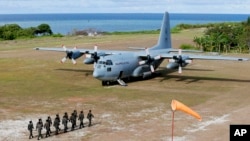South China Sea Chinese forces tried to drive away two Philippine planes carrying Manila's defense and military chiefs Friday near a Chinese man-made island, officials said, adding they admired seeing up close the stunning city-like features, including buildings, roads and a runway in the South China Sea's hotly contested region.
Defense Secretary Delfin Lorenzana said the aircraft continued uninterrupted after Filipino pilots messaged back to the Chinese that they were flying over Philippine territory. The Chinese warned the Philippine aircraft they were entering the periphery of Chinese installations and told to avoid miscalculation.
The aircraft that took Lorenzana, military chief of staff Gen. Eduardo Ano and about 40 journalists to Philippine-occupied Pag-asa Island were "challenged'' by China as they flew in the vicinity of Chinese-held Subi Reef, just 25 kilometers (15 miles) away.
"Those were just exchanges and no untoward incident happened,'' Lorenzana told reporters, adding that those normally transpire amid the unresolved territorial conflicts.
The Chinese navy has similarly warned U.S. ships and aircraft to leave what Beijing claims as its territory, messages which the Americans also ignored.
On Pag-asa, known internationally as Thitu, Lorenzana announced that the Philippines would start to develop the island, the second-largest in the Spratly archipelago, with plans for a wharf and reinforcing and extending the partly-eroded dirt airstrip. China may protest the planned constructions, but Lorenzana said he did not expect it to worsen into a confrontation.
Asked what he thought of China's rapidly developed Subi Reef near Pag-asa, Lorenzana he was awed.
"A grudging admiration to the Chinese for their resolve and single-mindedness to bolster their claims,'' Lorenzana said in a text message to The Associated Press. "I wished we had the same.''
China claims virtually the entire sea and has aggressively tried to fortify its foothold by transforming in recent years seven mostly submerged reefs into island outposts, some with runways and radars and more recently weapons systems, to the consternation of other claimants and the United States, which insists on freedom of navigation in international waters.
Philippine security officials also said they were checking reports that Filipino fishermen were harassed by the Chinese coast guard near Union Bank in the South China Sea few days ago. Lorenzana said authorities have yet to get the fishermen's statements, but if true, the Philippines would file a diplomatic protest with China.
China's radio warnings to the Philippine military planes took place despite the improved relations between the Asian neighbors after President Rodrigo Duterte, who took office in June, reached out to Beijing.
Duterte himself had planned to fly to Pag-asa to raise his country's flag when the Philippines celebrates its Independence Day on June 12, but dropped the plan after China raised concerns.
After a flag-raising ceremony on Pag-asa, Lorenzana told troops that Duterte had ordered him to inspect the island and ensure facilities are built there as soon as possible.
About 1.6 billion pesos ($32 million) has been earmarked for the construction, including a fish port, solar power, water desalination plant, improved housing for soldiers, and facilities for marine research and tourists.
The government also plans to fortify small buildings on eight much smaller reefs and atolls occupied by Filipino forces.
The latest visit may highlight the territorial disputes when Duterte hosts an annual summit of Southeast Asian leaders in Manila next week. The 10-member Association of Southeast Asian Nations, which the Philippines currently chairs, expects to conclude talks with China this year on the framework of a regional code of conduct that aims to prevent the long-simmering disputes from escalating into a shooting war.
Associated Press writers Jim Gomez and Teresa Cerojano in Manila, Philippines, contributed to this report.




